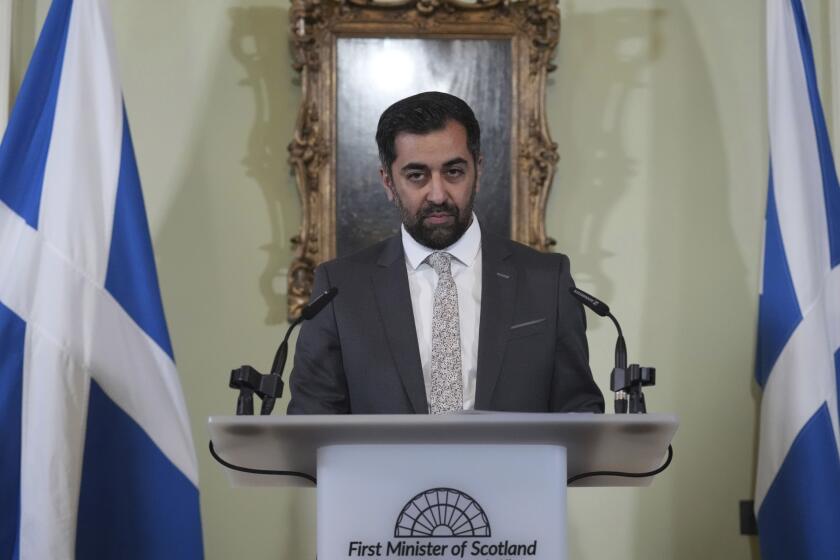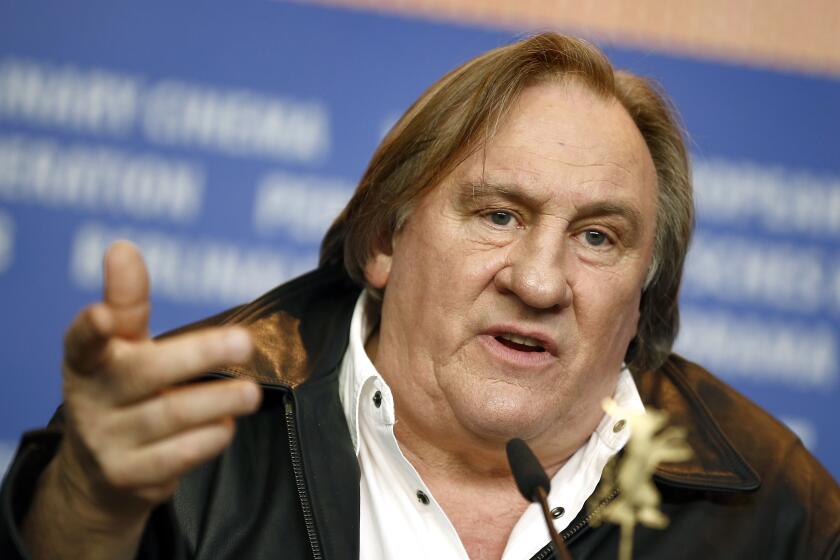U.N. Blessing Is Just a Frill for a U.S. War in Iraq
Is the postwar world breaking up? The U.S. drive to war in Iraq has divided the U.N. Security Council, caused one of the bitterest transatlantic rows in living memory and even split the European Union into pro- and anti-Bush wings.
The hullabaloo has left four people smiling. French President Jacques Chirac is thrilled to see Paris at the center of world power politics; Russian President Vladimir V. Putin is busy calculating his country’s gains if the United States and the Franco-Germans get into a bidding war for his support; Saddam Hussein is overjoyed to see the international coalition against him fragmenting; and Osama bin Laden no doubt rejoices to see disarray among a group of countries he wishes to destroy.
But how bad is it, really? Will U.S. defiance damage the Security Council if America goes to war without a second U.N. resolution? And will the transatlantic partnership splinter under the threat?
On the U.N. front, the news is good -- sort of. A U.S. decision for war in Iraq without a second resolution won’t weaken the Security Council much -- but only because the council isn’t that strong to begin with.
The sad truth is, the Security Council doesn’t count for much when nations contemplate war. According to the Stockholm International Peace Research Institute, since 1945 there have been 26 international wars, with total deaths estimated at 3.5 million. Only three of those wars had Security Council authorization, including the recent conflict in Afghanistan; the largest, the 1950-53 Korean conflict, was only a U.N. operation because Josef Stalin was in a snit and had ordered his Soviet representative to boycott council meetings.
Since 1945, the United States has sent troops into other countries with the prospect of combat more than 50 times; in the great majority, no Security Council approval was either asked or given. Past U.S. interventions without U.N. authorization include Vietnam; Haiti and Kosovo during the Clinton administration; Panama under the first President Bush; Grenada under President Reagan; and the ill-fated attack on Iran when Jimmy Carter was in the White House. In fact, from Harry Truman to the present, every U.S. president has intervened militarily abroad without the Security Council’s blessing.
The United States may be a diplomatic cowboy, but we aren’t riding the only horse on the range. Every permanent member of the U.N. Security Council has undertaken at least one war without the council’s permission or endorsement. China attacked India in 1962 without a Security Council resolution, and again without a resolution attacked Vietnam in 1979. The Soviet Union intervened in Afghanistan, Czechoslovakia, East Germany and Hungary without going to the Security Council. Britain and France invaded Egypt in 1956 without informing, much less consulting with, the Security Council. More recently, both Britain and France have sent troops to Kosovo and various African destinations without council advice or consent.
The plain if slightly sad fact is that from the day the U.N. Security Council first met in 1946, no great power has ever stayed out of a war because the council voted against it, and no great military power ever got into a war because the Security Council ordered it to.
So, whether or not Bush gets a second council resolution on Iraq, the outlook for the Security Council is more of the same.
But what about the Western alliance? Will disagreements over war with Iraq break up the oldest and most successful democratic partnership in the world?
The best answer is probably not, although this largely depends on what happens during and after any war. If the war goes reasonably well -- a quick and clean U.S. victory with relatively few civilian casualties -- the damage to U.S.-European relations will be limited. If, as is likely, coalition forces find significant quantities of weapons of mass destruction, along with hard evidence of the use of torture and murder by Hussein’s security forces and documentation of the considerable links between Iraqi intelligence and terrorists, the U.S. stand will be partly vindicated in many European eyes. British Prime Minister Tony Blair will look like a hero, and Chirac and German Chancellor Gerhard Schroeder, along with the rest of “old Europe,” will be on the defensive as the EU expands.
That doesn’t mean there won’t be problems. Many Europeans feel that U.S. “war on terror” rhetoric is overstated; they also think that U.S. policy, by sticking too close to Israel, is at least partly responsible for terror attacks. The Bush administration plans to fight terrorists by rooting out Al Qaeda and cracking down on states that sponsor or tolerate them; the Europeans think we can reduce terrorism by reining in Israeli Prime Minister Ariel Sharon and giving Arab countries more of a pass.
In any case, the deeper problem is not France, a country that has long sought to counter U.S. power. It is Germany, where public opinion is dangerously moving in an anti-American direction. This is not just because of Iraq, although Iraq has been a catalyst. It is also about the Israel-Palestine conflict, the profound German aversion to war and, to a certain extent, resentment over U.S. power in Europe and the world. It is about values, too; Germans love international institutions like the international criminal court.
Once the war against Iraq is over, Bush needs to send candy and flowers to its estranged allies in Europe. If it makes a serious effort, it is likely to succeed; if not, it will add to the number of countries and governments that envy U.S. power -- and that are willing, if they can get away with it, to scatter banana peels, rather than rose petals, before the feet of the world’s superpower.
Don’t look for the candy and flowers to take the form of concessions on the Kyoto Protocol and the international court. The last time the U.S. Senate voted on the Kyoto Protocol, the vote was 95 to 0 against; whatever European Greens say, no U.S. president can get an environmental agreement through Congress that imposes costs on U.S. manufacturers but exempts their competition in developing countries like China. And while a reformed court -- one in which permanent members of the Security Council could veto prosecutions -- could pass the Senate, it’s unlikely that the Europeans would be willing to compromise.
Where the Bush administration could and probably would reach out is the Middle East, specifically, the Israeli-Palestinian conflict. Palestinian Authority President Yasser Arafat accepted a key U.S. demand when he agreed to name a prime minister; Bush and Secretary of State Colin L. Powell are on record calling for a Palestinian state in the near future. Movement on Palestine is a key European demand; support for a new peace initiative is one way that the old Europe and the U.S. can patch up their differences.
Ultimately, the U.S. and Europe want the same things in the Middle East: democracy and stability. As long as enough people on both sides of the Atlantic keep this goal in mind, the alliance should hold together, despite the occasional disagreements and squabbles that inevitably test even the happiest of marriages and the closest of friendships.
More to Read
Start your day right
Sign up for Essential California for news, features and recommendations from the L.A. Times and beyond in your inbox six days a week.
You may occasionally receive promotional content from the Los Angeles Times.






